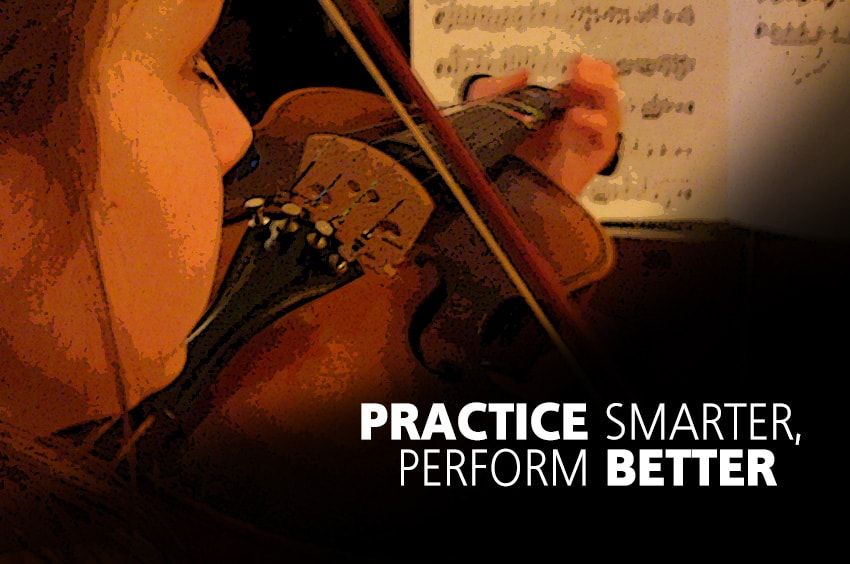Maximize Your Time with These Practice Tips
In this article, we’ll go through simple dos and don’ts of maximizing your practice time.

Why do we practice? Sometimes it’s fun to pick up or sit down to your instrument and just play around, but that’s not really practicing. Practice, by definition, is a repeated performance or systematic exercise for the purpose of acquiring skill or proficiency. We as musicians are continuously honing our skills, reaching for the next level of competency and ultimate mastery of our instruments. Practice is work! And with these practice tips, you’ll be able to make the most of all the effort exerted during those precious practice hours.
We’ll go through simple dos and don’ts of maximizing your practice time. And, like anything new, it’s going to take some practice to get used to practicing at your highest level. Be patient, try your best, and, most importantly, enjoy the music!
DON’T WORRY When you’re worried, you’re more than likely not giving 100% of your attention to what you’re practicing. Distractions like running through your grocery list or thinking about tomorrow’s math assignment will keep you from being able to fully engage in the moment.
One tip for worrying less is to think about what can be done in the immediate moment to remedy the situation. An example would be to tell yourself, “I’m worried about the math assignment, but worrying about it won’t help the situation. I’ll focus on practicing now, and deal with that math assignment later today.” Or, in the case of the grocery list, “I’ll write this down now, so it doesn’t distract me during my practice.”
Worrying about an upcoming performance can hurt your productivity in the practice room as well. Read about practice tips specifically related to performance anxiety here.
DON’T PRACTICE MINDLESSLY Mindless practicing is one of the worst ways to hinder your musical advancement. Sure, you can repeat a passage over and over again again until you memorize it in the moment, but studies show that that that those gains in ability will be short-lived and not translate into actual learning.
“Massed practice,” or the repetition method, will give the illusion of learning, but progress is actually an effect of short-term memory. However “random practice,” or mixing up your playing of difficult passages up with other passages during a session, will pay off the next day, when you’ll notice measurable improvement and skill retention.
DON’T MAKE IT A CHORE If you begin a practice begrudgingly, chances are you’ll not be able to avoid the previous DON’TS on our list. If possible, pick a practice time in which you’re most aware and alert. If you’re a morning person, practice after breakfast. If you’re a night owl, practice before bed. (So long as you don’t bother your roommates, we’re not advocating for that!)
Similarly, it’s optimal to customize the length of time you practice to your own concentration span. If you only feel fully engaged for 20 minutes at a time, that’s fine! Just sit down for multiple 20-minute practice sessions throughout the day. If you can practice mindfully for an hour or more, that’s fantastic as well. Tailor your practice times to what works best for you.
Now, let’s look at practice tips for what you SHOULD do to make the most of your practice time.
DO SET CLEAR GOALS Write your specific, measurable goals in a practice notebook, and check them off as you achieve them. Studies prove that the act of writing down your goals will boost your likelihood of reaching them. The key in this is that the goals must be measurable, meaning you’ll clearly be able to gauge when you accomplish each one. Also, set due dates for your goals to help hold yourself accountable.
Say you’re having difficulty with phrasing in a new piece. An example of a goal you’d write down would be “I want to play through this piece 3 times without a phrasing mistake.” Of course, we’ve already learned that all 3 times should occur spread throughout the practice (see second DON’T). Once that’s completed, you can check it off your goal list for the day.
A great bonus to writing down and checking off goals is the confidence you’ll feel when looking back on all that you’ve accomplished!
DO PRACTICE IN PERFORMANCE MODE One study found that about 47% of our waking hours are spent thinking about something other than the matter-at-hand. That’s a lot of mind wandering!
Try to approach practicing just like you do performing. Stretch and warm up the same way you do prior to a big performance. The familiarity of the movements not only will help you focus during your practice session, it’ll also help calm possible nerves on performance day.
DO MONITOR YOUR PRACTICE It takes a little getting used to, but recording yourself practicing can provide a world of helpful insight. Either via video or just sound, you’ll be able to observe and adjust slight nuances you don’t necessarily notice in the moment.
You’ll want to listen to the recording a while after your practice session ends as well. Objectively listening with fresh ears will offer the greatest benefit. Plus, you’ll be able to look (and listen) back on how far you’ve come and appreciate all that hard practice work you put in!
Do you have additional practice tips or activities that have helped you achieve your goals? Are there any practice methods that you’ve found to work really well? We, and your fellow readers would love to hear them! Share your insights with us in the comments below!

